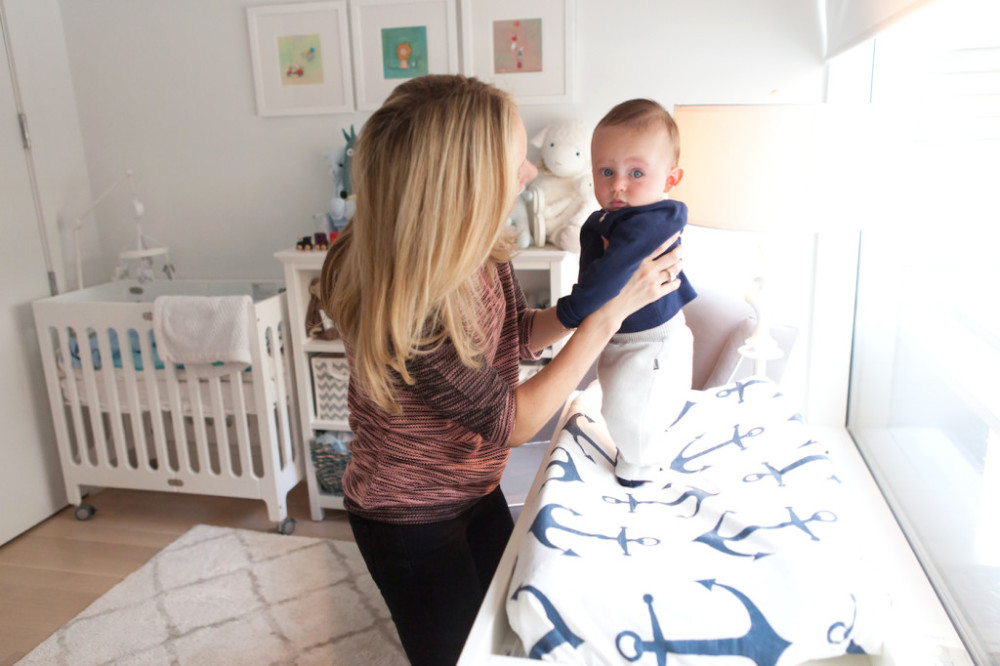By Cheryl Truman
Lexington Herald-Leader
WWR Article Summary (tl;dr) Two female entrepreneurs are giving a big boost to the manufacturing economy of Carlisle, Kentucky. In 1990 Kentucky employed more than 32,000 in apparel manufacturing but many of those jobs moved overseas. Caroline Eager and Carol Ann Anderson founders of Liz and Roo (A luxury line of fabrics) will operate the manufacturing of their “Liz and Roo” line of luxury linens for babies in Carlisle.
Lexington Herald-Leader
Caroline Eager holds up a fine piece of linen-blend fabric, a high thread count rectangle in a classy lavender print.
Is it for upholstery? Luxury duvets for master bedrooms? A window treatment in a kitchen with quartz counters and Sub-Zero appliances?
It’s an infant car seat canopy cover, part of the Liz and Roo line of luxury linens for babies.
“It caters to someone who wants a more customized nursery,” said Caroline Eager, who started Liz and Roo in 2013 with Carol Ann Anderson.
The two wanted to design and market sophisticated bedding for a clientele with cosmopolitan tastes. Moreover, they wanted to make it in the United States — a change from a time just a few years ago when textile manufacturers were fleeing the U.S. and towns like Carlisle for low-cost manufacturing offshore.
Liz and Roo products are available online, at baby stores around the country and online at BuyBuyBaby.
Caroline Eager said she had seen baby linens made in China; she even has some with her on this trip to Carlisle. She doesn’t care for them — their materials, design, work environment and the sewing she can’t oversee to guarantee day-to-day quality.
Liz and Roo products are being sewn in North Carolina, but production is gearing up in Carlisle.
“The goal is that the whole operation is here,” Eager said. “We’re just getting started here.”
Liz and Roo is a division of American Made Dorm & Home, which provides bed linens and bath accessories for dormitories and homes. But Eager says there are four million pregnant women in the U.S. at any one time, and they’re going to need something cute to put in the baby’s crib: “Mom buys, Grandma buys, baby showers buy,” Eager said.
“We believe in specializing and keeping our eye on the ball, so baby bedding it is,” she said.
Ricky Hicks, part owner of 3 Star Industries in Carlisle, hopes that Liz and Roo’s business signals the beginning of bringing cutting and sewing back to Nicholas County. The area still has plenty of talented textile workers, among them Lois Mitchell, 69, who worked at Jockey for 31 years.
On May 23, she was back in the former factory at a sewing machine to work on the Liz and Roo carseat cover. While she worked, sample items in discontinued prints were stacked nearby in blue and coral (coral is a huge color trend in girls’ nurseries, as a casual glance around Pinterest will verify).
Liz and Roo says that its designs are sewn by hand. That doesn’t mean that they’re produced with only a needle and thread, Eager said.
Eager said that means that seamstresses such as Mitchell “are looking at each piece, she’s looking at the quality of every piece.”
In the former Jockey building on Concrete Road in Nicholas County, 3 Star, a cut and sew company, already produces cab enclosures, windshields and other items for sport vehicles.
Jockey was once one of central Kentucky’s major employers: In Carlisle, a town with just under 2,000 residents, the company ran sewing and knitting operations. The county park is still known as Jockey Park.
In 2000, Jockey closed its Carlisle sewing plant, moving jobs offshore and laying off 326. In 2004, it closed the Carlisle knitting plant. Both moves were a shock to the Nicholas County economy, where employees, sometimes even married couples, had anticipated a lifetime’s employment at the Jockey plant.
Kentucky employed more than 32,000 in apparel manufacturing in 1990. But the move to cheaper offshore manufacturing was rough on Kentucky apparel makers: By 2003, the number had declined to 8,900. In 2014 Fruit of the Loom laid off all 600 employees at its Jamestown plant; the company had once been a Kentucky manufacturing leader second only to General Electric.
The former Jockey plant has been subdivided and is now home to other endeavors, such as Charlie’s Beer Cheese, but there is again cutting and sewing going on in the plant by entrepreneurs who pride themselves on American-made products.
What makes Liz and Roo products more expensive? Think high-thread count items in prestige patterns made from fabric by a company in Mississippi with water-based dyes. Liz & Roo’s items could double as fabric for your sofa or fit right into your tasteful decorating plan — hence no frolicking Skittles-colored cattle or cheap batting.
Liz and Roo sheets are sewn with deep pockets and high-end one-inch elastic so they won’t slip during a quick midnight crib sheet switch. In quality, it’s like the difference between silk and burlap.
The company’s best-selling print is navy anchors on a white background. Parents can customize with their choice of sheet, bedskirt, soft-sided blanket, and crib rail pad. There’s also plenty of gray and taupe as well as some of the more traditional nursery colors such as blue and pink.
The fabric for the “minky” blankets is from Korea and is the only item not made in the U.S. The blankets are lush but lightweight faux fur, so popular that they are made in an adult size ($129.99) as well as in junior size.
The company sends a handwritten note in every box that goes to a retail location. Liz and Roo sends swatches to customers who can’t make it to a store, and Eager said that has been invaluable to some customers who live in remote areas.
“They’re so happy to buy it online,” she said.














































































































































































































































































































































































